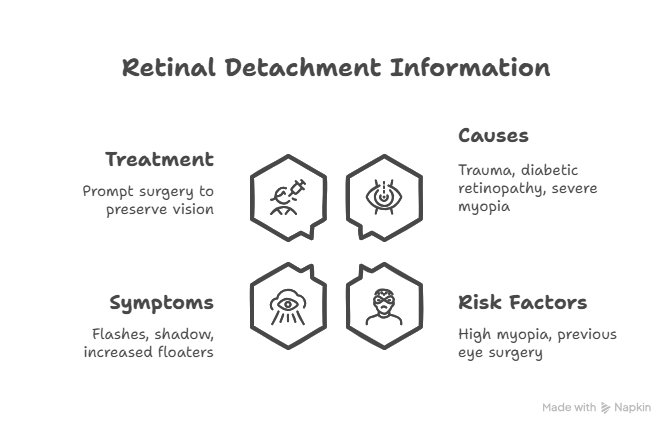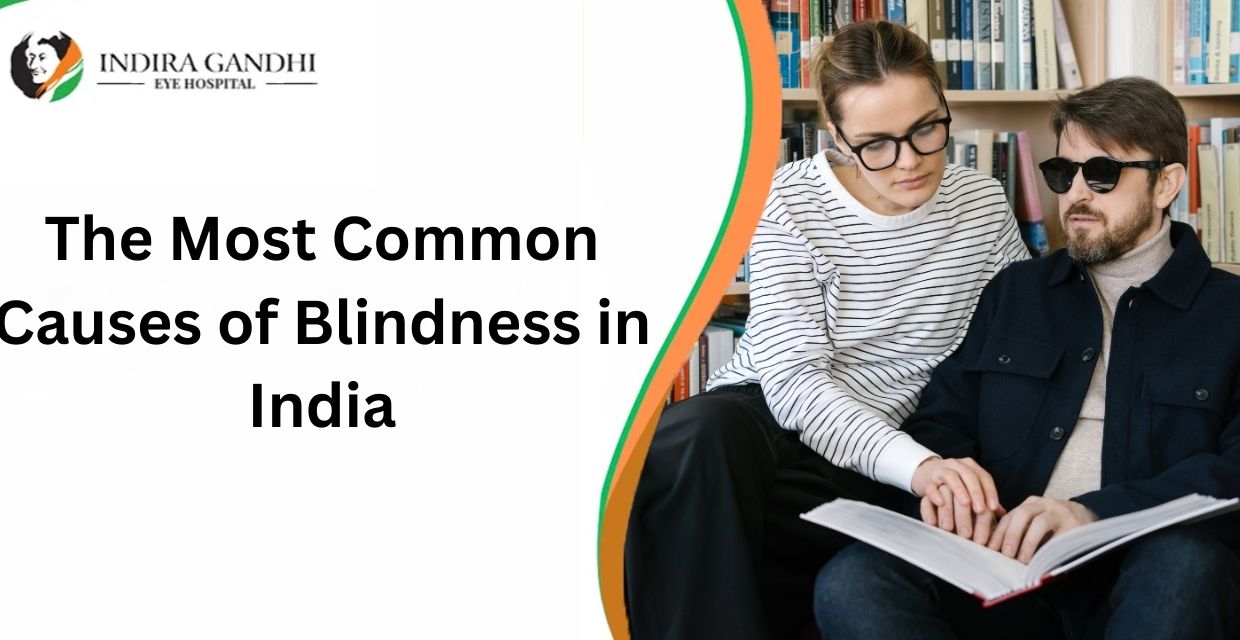|
Getting your Trinity Audio player ready...
|
Blindness is a serious health issue in many parts of the world, and India is no exception. According to the World Health Organization (WHO), India accounts for a significant portion of the global blind population. While many eye conditions are treatable, blindness can still be a major concern, especially if people do not seek medical care early enough. In this blog, we will discuss the commonest cause of blindness in India, providing you with essential information about these conditions and what can be done to prevent them.
At Indira Gandhi Eye Hospital & Research Centre (IGEHRC), we believe in the importance of awareness and early intervention when it comes to eye health. By understanding the causes of blindness, we can take steps to prevent or treat many of these conditions. So, let’s dive into the major causes of blindness in India and what can be done about them.
Understanding Blindness and Its Causes
Blindness is defined as the condition of having no vision or the inability to see, even with corrective measures like glasses or contact lenses. In many cases, blindness is caused by diseases or conditions that affect the eyes’ structure or function. Some causes are preventable, while others are related to genetic factors or aging. Regardless, understanding the commonest cause of blindness in India can help us focus on prevention, early detection, and proper treatment.
Now, let’s take a closer look at the leading causes of blindness in India.
1. Cataracts: The Leading Cause of Blindness in India
Cataracts are by far the most common cause of blindness in India. A cataract is the clouding of the natural lens of the eye, which leads to blurred vision and, if untreated, can cause complete blindness. Cataracts typically develop as part of the aging process but can also be caused by genetic factors, injury, or prolonged exposure to ultraviolet (UV) light.
Why Cataracts Are So Prevalent in India

India has a large aging population, and as people grow older, the chances of developing cataracts increase. Moreover, the intense sunlight in many parts of India, without adequate eye protection, can contribute to the early onset of cataracts.
Treatment and Prevention
The good news is that cataract surgery is highly effective and widely available in India. In fact, cataract surgery is one of the most commonly performed surgeries in the country, with many patients regaining full vision after the procedure. At Best Eye Hospital in India, we offer state-of-the-art cataract surgery with intraocular lens (IOL) implantation, which is both safe and effective in restoring vision.
Prevention involves protecting your eyes from UV light by wearing sunglasses and hats and maintaining a healthy diet rich in antioxidants.
2. Glaucoma: The Silent Thief of Sight
Glaucoma is another major cause of blindness in India. It refers to a group of eye diseases that damage the optic nerve, often due to high intraocular pressure. This damage can lead to permanent vision loss if left untreated. Glaucoma is particularly dangerous because it usually develops slowly and without noticeable symptoms in its early stages. This is why it is often referred to as the “silent thief of sight.”
Why Glaucoma Is a Concern
Glaucoma is one of the most common causes of blindness in India due to the lack of early detection. Many people are unaware that they have glaucoma until significant vision loss has occurred. It is more prevalent in people over 40 and those with a family history of the disease. Other risk factors include diabetes, high blood pressure, and certain eye conditions.
Treatment and Prevention
Glaucoma can be managed with medication, laser treatments, or surgery. Regular eye exams are critical for detecting glaucoma early, especially if you are at risk. At IGEHRC, we offer comprehensive eye examinations to diagnose glaucoma and monitor intraocular pressure to prevent vision loss. While glaucoma cannot be reversed, early detection and treatment can help preserve vision.
To prevent glaucoma, it is essential to have regular eye check-ups, especially as you age or if you have risk factors like family history or diabetes.
3. Diabetic Retinopathy: A Consequence of Diabetes
Diabetic retinopathy is a serious complication of diabetes that affects the blood vessels in the retina. Over time, high blood sugar levels can damage these blood vessels, leading to leakage, swelling, and even retinal detachment. Diabetic retinopathy is one of the most common causes of blindness in India, particularly as the incidence of diabetes continues to rise across the country.
Why Diabetic Retinopathy Is a Growing Concern
India is home to a large diabetic population, and diabetes is often poorly controlled due to dietary habits, lack of awareness, and limited access to medical care in some areas. People with uncontrolled diabetes are at a high risk of developing diabetic retinopathy, which can lead to blindness if not treated early.
Treatment and Prevention
The good news is that diabetic retinopathy can be managed with timely medical intervention. Treatment options include laser therapy, injections into the eye, and surgery, depending on the severity of the condition. Managing diabetes effectively through diet, medication, and regular blood sugar monitoring is the best way to prevent diabetic retinopathy. Regular eye exams are essential for people with diabetes to catch the disease early before vision loss occurs.
4. Age-Related Macular Degeneration (AMD)
Age-related macular degeneration (AMD) is another leading cause of blindness in India, especially among the elderly. AMD is a progressive disease that affects the macula, the part of the retina responsible for sharp, central vision. There are two types of AMD: dry and wet. Wet AMD is more severe and leads to rapid vision loss.
Why AMD Is a Concern
With India’s aging population, AMD is becoming more prevalent. It is the most common cause of blindness in India in people aged 60 and above. AMD typically leads to blurred or distorted central vision, making it difficult to read, drive, or recognize faces.
Treatment and Prevention
While there is no cure for AMD, treatments such as anti-VEGF injections, laser therapy, and lifestyle changes can slow down its progression and preserve vision. It’s important to eat a diet rich in antioxidants, vitamins, and minerals, especially lutein and zeaxanthin, which are known to protect the retina. Quitting smoking and managing blood pressure are also key factors in reducing the risk of AMD.
5. Retinal Detachment

Retinal detachment occurs when the retina separates from its underlying tissue, leading to the loss of vision. It is a serious condition that requires immediate medical attention. Retinal detachment can be caused by trauma, diabetic retinopathy, or other underlying conditions like severe myopia.
Why Retinal Detachment Is a Concern
Retinal detachment is a commonest cause of blindness in India because of the high incidence of eye injuries, especially in rural areas, and the lack of awareness about the condition. People with high myopia or those who have previously undergone eye surgery are at higher risk.
Treatment and Prevention
Retinal detachment requires prompt treatment, which may involve surgery. The earlier the condition is diagnosed and treated, the better the chances of preserving vision. It is essential to seek immediate medical attention if you experience symptoms like sudden flashes of light, a curtain-like shadow over your vision, or a sudden increase in floaters.
Conclusion: Preventing Blindness in India
Blindness is a major public health issue in India, and while many of the commonest cause of blindness in India are preventable or treatable, a significant number of people still suffer from vision loss. Cataracts, glaucoma, diabetic retinopathy, age-related macular degeneration, and retinal detachment are some of the leading causes of blindness in the country.
Early detection, regular eye exams, and timely treatment are critical in preventing blindness and preserving vision. At Best Eye Hospital in India, we are committed to providing world-class eye care and treatment for all. Whether it’s cataract surgery, glaucoma management, or diabetic retinopathy treatment, we offer a comprehensive range of services to protect and preserve your vision.
If you or someone you know is at risk of blindness, don’t wait. Schedule an eye exam today at IGEHRC and take the first step toward protecting your vision for a lifetime.
What is the most common cause of blindness in India?
The most common cause of blindness in India is cataract, especially age-related cataract. It remains a major public health issue due to limited access to timely surgical intervention in many regions. Other causes include uncorrected refractive errors, glaucoma, diabetic retinopathy, and corneal diseases, but cataract continues to be the leading cause.
What are the most common causes of blindness?
Globally, the most common causes of blindness include cataract, glaucoma, age-related macular degeneration, diabetic retinopathy, and uncorrected refractive errors. In developing countries, infections and corneal diseases also contribute significantly. The prevalence of each cause can vary depending on the population, age, and access to healthcare services.
What is the most common cause of legal blindness?
The most common cause of legal blindness, particularly in developed countries, is age-related macular degeneration. In other parts of the world, especially where healthcare access is limited, cataract and glaucoma are also leading causes of legal blindness. The specific cause often depends on geographic and socioeconomic factors.












